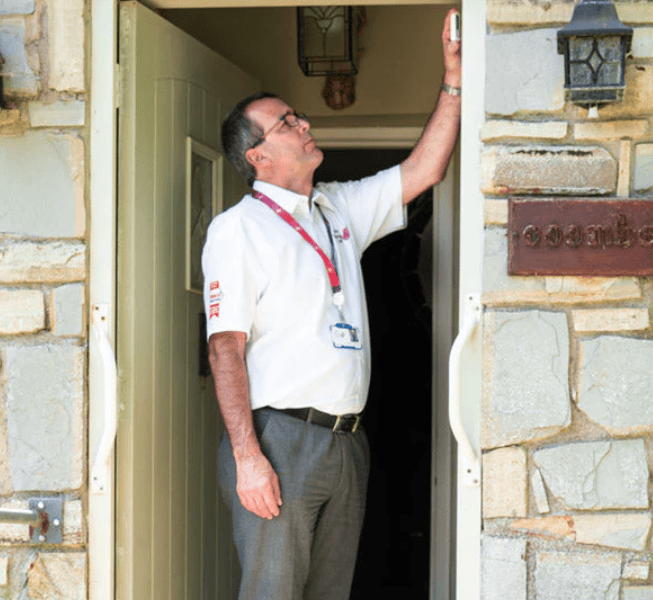
We can all stumble or trip at times, however, for older adults, the consequences of falling can be greater.
Not only can falls result in fractures and sustained injuries, but they can have a long-term impact on the confidence of older adults, which may affect their long-term independence.
After some careful thought and preparation, however, the risk of falling can be reduced, helping to maintain the independence of your older loved ones for longer.
The growing risk of falls
With a growing elderly population and levels of physical activity decreasing in the over 65s, significantly due to a result of the COVID-19 pandemic, the risk of injury from falls has increased.
However, falling doesn’t have to be an inevitable part of ageing. Improvement in strength and balance can help reduce the risk of a fall.
Moreover, many falls can be prevented with changes around the home to remove trip hazards, maintain eye care, and foot health and manage medications.
Reducing the risk of falls
The most frequent contributing factors to falls are frailty, impaired balance, and lower muscle strength.
It is possible to slow and even decrease the onset of these factors through exercise and diet, which can further reduce the risk of a fall and improve quality of life.
Additionally, between 30 per cent-50 per cent of falls are due to environmental causes, such as slippery floors in the bathrooms, and poor lighting in the bedroom.
Some simple checks and modifications could help fall-proof the home and make it a safer environment.
Moreover, poor eyesight can also lead you or your loved one to trip or lose balance. It is always best to go for regular eye tests and get your or your loved one’s prescription reviewed.
Other health complications like low blood pressure or poorly controlled diabetes can also be the reason for feeling dizzy or faint.
Sometimes certain medications can also make you or your loved one feel dizzy, if this happens, talk to a GP or pharmacist to alter the dose of the medications or get prescribed an alternative medicine.
Taking care of your feet is crucial too, as foot problems can stop you or your loved ones from getting out-and-about.
Solutions such as, wearing the right-fitting shoes and well-fitted trousers/skirts that don’t trail on the ground can help to reduce the risk of falling.
Consequence of falls
In the most critical incidents, falls can relate to death and even when not fatal, the consequences of falling are the leading cause of older adults losing their independence and moving into a care home.
Whilst care homes provide a high level of care support, they come with a high financial cost of around £3,600 per month and for many of us, remaining in our homes is a priority as we age.
Getting help quickly when you fall can mean you receive the correct medical assistance sooner, which can reduce the complications and long-term consequences of falling.
During the winter months, hypothermia is a real risk if someone is left lying on the floor and is unable to call for help.
Getting help in an emergency
The priority for most of us as we age is to remain independent and healthy in the homes we love.
With the cost-of-living crisis and staffing pressures affecting care homes and social care services, more and more of us are looking at alternative care solutions for our loved ones.
Fortunately, there are alternatives that cost less than traditional home care services and provide round-the-clock support.
With a personal alarm, you can call for help at the touch of a button from a specialist alarm monitoring centre.
Some personal alarms include built-in fall detection and will automatically make an alarm call when a fall is detected.
Taking Care are one of the UK’s leading personal alarm providers with a range of fall alarms and emergency alarms that work at home and out-and-about.
If you or your older family members do not want to wear an alarm pendant, or you want additional reassurance that your family members are OK when you cannot be with them, then there are newer technologies that monitor health and activity.
Taking Care Prevent is one of the most innovative products in the UK market. It combines a state-of-the-art fitness watch with activity tracking and one-to-one guidance and advice to reduce frailty and the risk of falls.
Smart home monitoring solutions such as Taking Care Sense are non-intrusive and low maintenance. They are designed to provide peace of mind and can be combined with a personal alarm for extra reassurance.
Sensors that detect movement, activity patterns around the home and temperature extremes use powerful Artificial Intelligence to identify when a behaviour change may indicate something is wrong.
Taking Care’s Emergency Resolution Team will then be alerted and can take action by contacting the person at home, family members or the emergency services if needed.
Understanding the causes of falls and the risks involved will go a long way to ensuring that you or a loved one avoids unnecessary falls at home or out-and-about.
Solutions, like fall alarms and preventative technologies, can help minimise the risk of a fall. Moreover, if you fall, you can get help as quickly as possible.
Taking Care is here to support you or your loved one with different ranges of personal alarms and preventative solutions to minimise the risk of falls.
Taking Care’s Emergency Resolution Team is available 24 hours to provide help in case of any emergency.
This is an excerpt from our Special Report – Falls Management: Innovations for an Ageing Population






